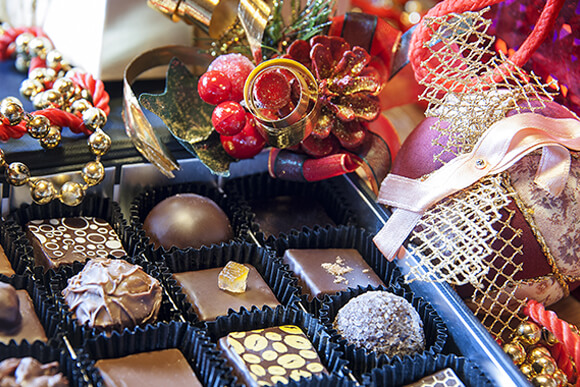Human Foods to Avoid Giving Your Dog This Christmas

While it may be tempting to give your dog a special treat this Christmas, many foods that we will tuck into over the festive period are actually harmful to dogs and can be extremely dangerous if digested.
Here are a few pointers to avoid a trip to the vets over the holidays:
Chocolate
There is lots of it around the house over the Christmas period, from advent calendars to the traditional tin of treats your family share on Christmas day, however chocolate contains a stimulant called theobromine that is poisonous to dogs. Theobromine mainly affects the heart, central nervous and kidneys and tends to occur from 4-24 hours after ingestion. Signs of poisoning to look out for are vomiting, diarrhoea, restlessness, hyperactivity and seizures.
If you think your dog has ingested chocolate you must contact your vet immediately. In most cases your vet will make your dog vomit to eradicate the theobromine, they may also use an intravenous drip to control your dog’s heart rate, blood pressure and seizure activity.
Caffeine
Caffeine also contains stimulants similar to those in chocolate, as this substance is found in the fruit of the plant that is used to make coffee.
While a couple of laps of tea or coffee will not do any harm, dogs are more sensitive to the effects of caffeine than human and the ingestion of moderate amounts of coffee grounds or tea bags can lead to poisoning.
Signs of caffeine poisoning in dogs are the same as chocolate and similar treatments will also be used by your vet.
Onions, Garlic and Chives
If digested by your dog these herbs and vegetables can cause stomach and gut irritation and could lead to red blood cell damage if a large enough amount is consumed.
All forms of onions are particularly toxic including any found in your table scraps and left over take away. Commercial baby food, sometimes fed as a supplement to young pets, may also contain onions which can cause illness. Signs of poisoning occur a few days after the onions have been digested by your dog.
Alcohol
Alcohol is something to be avoided completely as it is significantly more toxic to dogs than it is to humans. Remember to keep any alcoholic food or beverages out of reach of your dog over the festive period and of course the rest of the year!
Signs of alcohol poisoning to look out for in dogs are vomiting, diarrhoea, decreased coordination, central nervous system depression, difficulty breathing, tremors, abnormal blood acidity, coma and can be lethal.
Milk
Unlike humans, dogs do not have significant amounts of the enzyme lactase, which breaks down the lactose in milk. Feeding your dog milk or milk based products can cause diarrhoea and other digestive upset.
Grapes & Raisins
Little is known about why grapes and raisins are particularly toxic to dogs but if ingested these fruits can lead to kidney failure. If your dog has any existing health problems the ingestion of grapes and raisins may have a more serious effect.
Macadamia Nuts
Signs of poisoning from macadamia nuts tend to start within 12 hours of ingestion. Symptoms include weakness, depression, tremors, vomiting and hyperthermia and last for approximately 12 to 24 hours. If you suspect that your dog has any of these symptoms make a note of the possible quantity that has been consumed and contact your vet.
Corn on the cob
Corn on the cob may seem like a healthy treat this Christmas, however this is one vegetable that must be avoided as it does not digest well in a dog’s stomach. If your dog swallows a corn on the cob, whole or even in large chunks, this can get lodged in his digestive tract and cause intestinal blockage.
If your dog has ingested corn on the cob look out for signs of loss of appetite, vomiting, absence of faeces, diarrhoea or signs of abdominal discomfort. In this case consult your vet immediately!
If you suspect that your dog has ingested any of these items be sure to make a note of the quantity and contact your vet immediately.
